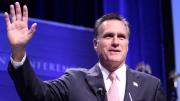The New York Times published a recent front-page feature examining what lessons may be learned from the time Mitt Romney, M.B.A ’74, J.D. ’75—winner of the first presidential preference contest of 2012 by a mere eight votes Tuesday night in Iowa—spent at the University in the 1970s, and how his education and previous experiences have shaped him as a potential Republican presidential candidate. Correspondent Jodi Kantor, J.D. ’01, interviewed Romney's professors and classmates, including Cizik professor of business administration Clayton Christensen, former marketing professor Howard Brownstein, Mark E. Mazo, J.D. ’74, Howard Serkin, M.B.A ’74, Stephen M. Waters ’68, M.B.A. ’74, and former Harvard Business School (HBS) dean Kim B. Clark.
According to the Times, Christensen recalls Romney drawing “a chart called a growth-share matrix with little circles to represent various pursuits: work, family, church,” during a presentation to HBS students on balancing work and family, several years after he’d graduated. “That day,” writes Kantor, “Mr. Romney was not only displaying his hallmark brand of almost comically analytical reasoning but also returning to the place where he first absorbed it.” Described as “eager, driven, and tremendously hardworking” by his classmates, Romney was a known as a “problem solver” who frequently “over prepared” and took nothing for granted.
The Times article reveals Romney as an intelligent man focused on success and high grades, going so far as to recruit “a murderers’ row of some of the most distinguished students in the class” for his HBS study group, according to classmate Serkin, who added that if Romney’s partners were not prepared for class, “he was not afraid of saying: ‘You’re letting us down. We want to be the best.’ ” “He won the high grades he craved,” writes Kantor, “becoming a George F. Baker Scholar, a distinction awarded to the top students in every business class, and would graduate from the law school with honors as well.”
The Times points out that Romney’s strong analytic skills afforded him success in the world of finance, and could set help him as a candidate to govern in an age of economic uncertainty. However, it is his lack of strong ideological convictions outside the realms of faith and family, according to the article, that could potentially be his downfall: “Nearly four decades ago at Harvard, Mr. Romney embraced an analytical, nonideological way of thinking, say former classmates and professors, one that both matched his own instincts and helped him succeed. On a campus rife with political and social ferment, he willfully distanced himself not only from politics, but also from larger ideological frameworks and heated debates.”
A devout Mormon who was married and a parent during his time at the school, Romney kept a social distance from many of his classmates, although he still remains “quite attached to the star study group he put together all those years ago, faithfully attending dinners the men hold every five years."
Of course, if Romney continues on to earn the Republican nomination, he will face off against a fellow alumnus: President Barack Obama, J.D. ’91.









